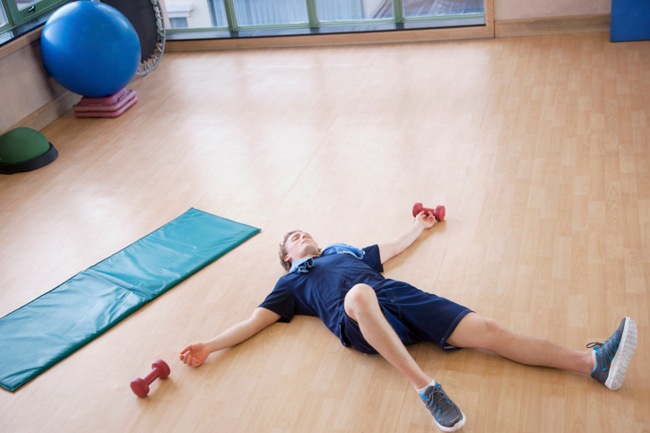Nobody approaches every single training session with bushy-tailed optimism and a bounce in their step. Obviously you can’t take a day off every time you don’t fancy training, but when should you heed your body’s warning that enough is enough?
It can happen to YOU
“Burnout can affect anybody, from inexperienced runners to highly conditioned professional athletes,” says former British army Physical Training Instructor Dan Reilly. “A new runner may suffer burn out from doing too much too soon, while older runners may be pushing themselves beyond their physiological limits. Runners who are training for a race are particularly prone to pushing themselves too hard and entering burn out.
“Any runner who is overloading the stimulus of their body and exceeding their ability to adapt and recover is going to risk burn out and injury as a result.”
Rest easy
“The day after any high-intensity workout, try to do an adrenal workout to help your body recover”, says Dan. “This is a relaxation workout, something like yoga, tai chi or meditation – anything to bring the body’s stress levels down.
“When you train at any kind of intensity, it raises the body’s cortisol and stress levels, and that’s where the danger of overtraining comes in. A rest day doing nothing does lower it, but doing an adrenal workout is far more effective.”
Sleeping lions
“The most important thing to avoid burn out is sleep,” says triathlon coach and former British champion Rick Kiddle. “You need your eight hours, no doubt about it. Sleep is when your body recuperates from whatever training you’ve put it through. Training puts a lot of stress on your body, and without the eight hours sleep it doesn’t have enough time to repair itself.”
GB coach Nick Anderson agrees: “Elite athletes often sleep again in the afternoon to improve recovery. In the real world many of us make do with 5-7 hours a night, which is markedly less than the body needs to get fitter and stronger. The key phase in sleep is actually the final third, as this is when many of the recovery processes occur. If you never reach that final third, long-term fatigue will be the obvious result”.
Run to the beat
“The most important thing is to listen to your body,” says Rick. “The best way to tell whether you’re at risk of burn out is to listen to your heart and take the delta heart rate test.
“Lay down for two minutes and then take your heart rate. Then stand up for two minutes and measure it again. The difference between the two measurements can tell you whether you’re starting to burn out. For fit, healthy and well-rested people, the difference will be between 1-10 bpm. Any higher than that is a sign you’re overtraining and risking burn out.
“If the difference is higher than 10, you should adjust your training accordingly,” says Rick. “If it’s between 11-20 bpm, you should reduce your training intensity by 5%. If the range is 20-30 bpm, reduce training by 20%. Any higher than that, take a day off training.
“It may only take half a day to a couple of days to get your delta range back down, and there’s no benefit to doing any training in the meantime. Take the test whenever you’re feeling lethargic or you’re underperforming, and whenever you make a change to your training schedule or intensity.”
See it coming
“There are a few set symptoms and signs that someone is going into burn out,” says Dan. “These are: sudden poor coordination, lack of ability to concentrate, reduction in performance, oversensitivity to criticism, disruptive sleep patterns, general lethargy and lack of motivation, and greater susceptibility to illness and injury. The minute these symptoms start occurring, it’s a sure sign that the athlete is entering burn out.”
Take a break
“If you have reached full burn out, the first thing to do is rest,” says Dan Reilly. “You’re probably looking at around a seven-day break, to let your body repair and allow cortisol (the body’s stress hormone) to release. Do absolutely no training, just eat well and allow your body to recuperate.
“When you start training again, you need to seriously look at the intensity of your training versus the amount of rest and nutrition you’re getting. If your rest and nutrition levels aren’t sufficient to support your training, that’s why you went into burn out. If you don’t address the imbalance, it will happen again.”
Want your say? Email us at editorial@wildbunchmedia.co.uk
Join the Men’s Running community for more comment, analysis and race information direct your inbox. Follow us on twitter @mensrunninguk







